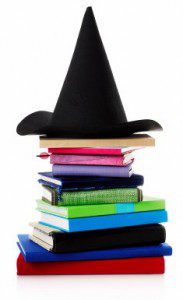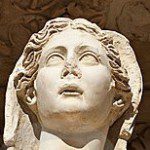 Monotheistic faiths often use the term “people of the book” to describe certain religious adherents. The term is most familiar to me from Islam, and the Koran uses that turn of phrase when referring to Jews, Christians, and Zoroastrians. It’s also sometimes used in Judaism in a self-referential sort of way. One group that the term has never been applied to are Pagans, both Modern and Classical, which is fine with me. We aren’t people of the book. Sure, we have books of ritual, and we sometimes pass down oath-bound materials, but our books of ritual are never absolutes, and if initiatory traditions simply stored all of their information on written pages the reasons for initiation would be a lot less. Most Pagans lack the one book that serves as the inspiration for all argument and all ways of doing things.
Monotheistic faiths often use the term “people of the book” to describe certain religious adherents. The term is most familiar to me from Islam, and the Koran uses that turn of phrase when referring to Jews, Christians, and Zoroastrians. It’s also sometimes used in Judaism in a self-referential sort of way. One group that the term has never been applied to are Pagans, both Modern and Classical, which is fine with me. We aren’t people of the book. Sure, we have books of ritual, and we sometimes pass down oath-bound materials, but our books of ritual are never absolutes, and if initiatory traditions simply stored all of their information on written pages the reasons for initiation would be a lot less. Most Pagans lack the one book that serves as the inspiration for all argument and all ways of doing things.
That’s not to say we don’t adore books. Many Pagans love books, and I would go so far as to say that we Pagans are a “people of the books,” in ways that other religious traditions are not. I’ve always kind of felt that way, but it was really brought home to me after reviewing my “Top 25 Pagans” list(s). Nearly all of the folks listed there are authors, or involved with print/media in some way. (Alex Sanders being the major exception.) When taken to task on the names I didn’t include, almost all of those folks were authors as well, but only almost.
I had one very astute individual ask why my list didn’t include a cross-section of composers, poets, and artists. A work such as Stravinsky’s The Rite of Spring is an amazingly pagan work, and it’s certainly the kind of art that can make someone feel pagan. What it doesn’t do though is express how to act on those feelings. It’s one thing to feel pagan, another to perform rites and to express a spirituality that are Pagan. It’s a subtle difference, but it’s the difference between being thought of as a bohemian and having a religious identity removed from Christianity (or any of the other major monotheistic faiths).
 Books have been a huge influence on Paganism, because until very recently, they were the only way to get information about Paganism. We live in an era that with the click of a mouse or a quick voice-command to Siri we can find out about all kinds of Pagan things, and even talk to other Pagans no matter where we live. That wasn’t always the case, and for many of us, our first exposure to Paganism was via books. I can look back on my life now and think “Yup, I was always meant to walk this path,” but I wouldn’t have figured out how to do ritual without first reading a few books. I’m not beholden to any one particular book, but writers have certainly helped to shape my Pagan thoughts and views. I certainly wouldn’t have ever thought of using the phrase “Blessed Be” unless I’d been introduced to it through books.
Books have been a huge influence on Paganism, because until very recently, they were the only way to get information about Paganism. We live in an era that with the click of a mouse or a quick voice-command to Siri we can find out about all kinds of Pagan things, and even talk to other Pagans no matter where we live. That wasn’t always the case, and for many of us, our first exposure to Paganism was via books. I can look back on my life now and think “Yup, I was always meant to walk this path,” but I wouldn’t have figured out how to do ritual without first reading a few books. I’m not beholden to any one particular book, but writers have certainly helped to shape my Pagan thoughts and views. I certainly wouldn’t have ever thought of using the phrase “Blessed Be” unless I’d been introduced to it through books.
There’s always been a romantic notion out there when it comes to the idea of how magickal material is handed down from one generation to another. Despite the very cool idea of secret knowledge only being shared orally, magickal material was almost always written down and put into books. There are books of cunning craft in England which were passed down (and continually added to) for generations. The grimoire tradition in Europe and the United States is especially strong, with printed books serving as a continual manual on how to practice ceremonial magick. Most magick users never had to wait for a teacher, books were a gateway into immediate doing. Secret societies and initiatory traditions could certainly be a part of the experience, but you could get your foot through the door simply by reading. People like “to do” and books have always provided a gateway into the magickal community, besides if you erect a barrier someone will find a way around it.
It’s hard to tell an American to “wait” to do anything, and the history of Modern Paganism in this country is a great example of that. In the 1960’s and 70’s when people were first becoming aware of the terms “Pagan” and “Witch” as being acceptable forms of religious practice, they turned the more English structure of “find a group, find a teacher, be initiated” on its head. The local Priestess wasn’t just a few hours away, she might be half a continent away, or so deeply hidden in the broom closet as to live on another planet. Instead of giving up, people used books to “make up their own” varieties of Paganism.
 In the fall of November 2011 I was lucky enough to visit the Graduate Theological Union in Berkeley CA where I got to look through the papers of (our own) Aidan Kelly. Aidan was one of the founders of the New Reformed Orthodox Order of the Golden Dawn, and wrote a lot of its early material. In the late 1970’s Kelly donated a diary and copies of his early rituals to the GTU. Those were the materials I was lucky enough to peek at, and they illustrated just how much Pagans have become “people of the books.”
In the fall of November 2011 I was lucky enough to visit the Graduate Theological Union in Berkeley CA where I got to look through the papers of (our own) Aidan Kelly. Aidan was one of the founders of the New Reformed Orthodox Order of the Golden Dawn, and wrote a lot of its early material. In the late 1970’s Kelly donated a diary and copies of his early rituals to the GTU. Those were the materials I was lucky enough to peek at, and they illustrated just how much Pagans have become “people of the books.”
All of NROOGD’s early rites were put together though material found from books and personal inspiration. There were no books of ritual in 1969, just bare bones material from Gardner, Leyland, Fortune, and Murray. Looking through NROOGD’s earliest rituals there was much that was familiar, and even more that was different. As the group progressed, and “101” books became available for the first time in the early 1970’s it was easy to see how their ritual evolved to take in this newer material. That sort of process wasn’t new to Paganism in 1972 and it’s not alien now, most of us continually push forward with our rites and rituals, incorporating whatever threads of wisdom inspire us. To never add anything to our practices would make us a “people of the book” instead of a “people of the books.”
Certainly with the rise of the internet the importance of books has diminished a bit. You can find great rituals online (and many of them are often better than what’s on the printed page), and participate in communities that instruct and teach. It’s possible to ask someone “what’s a stang?” and receive ten or fifteen answers within a few seconds. Heck, because of the internet we might all one day pronounce athame the same way (being from the Midwest I pronounce it ahth-uh-may, on the West Coast it’s said uh-tha-mee, and some people rhyme it with “whammy”). Those various prononciations are precisely because we are a people of the books, with people practicing Paganism with information gleaned from books instead of passed down from individual to individual.
Without an official book of prayer, and no one sanctioned “road map to deity” the Modern Pagan Community will continue to search for individual truths no matter where they hide. For the last two centuries many of those truths existed on the printed page, where they inspired and were then incorporated into magick and rituals. As the internet becomes a more primary source of information the power of the traditional book might diminish, but the power of written words, from a wide variety of sources, will remain.

















